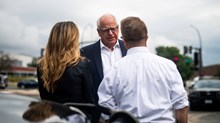The president's advisory council on faith-based initiatives is supposed to represent a wide spectrum of religious and community leaders. This includes a fair share of evangelicals, albeit evangelicals of a certain kind.
Last week, the White House announced that Willow Creek Community Church co-founder Lynne Hybels and National Association of Evangelicals (NAE) president Leith Anderson would serve on the Advisory Council on Faith-Based and Neighborhood Partnerships. Members serve one-year terms.
The choice of Hybels and Anderson follows in the line of previous evangelical council members. They are bona fides evangelicals who prefer to engage the culture, not war against it. Recently, both Hybels and Anderson spoke publicly in favor of immigration reform, actively lobbying Congress for reforms including a path to citizenship for immigrants who are in the U.S. illegally.
In addition to being president of the NAE, Anderson serves as Senior Pastor at Wooddale Church in Eden Prairie, Minnesota, which is the church home of Republican presidential hopeful Tim Pawlenty.
CBN's David Brody interviewed Pawlenty in December about Anderson's connection to Pawlenty's politics. "He's a wonderful person and a dear leader and minister but neither he nor [the NAE] is some sort of plug and play political operation. That's not how he views it," said Pawlenty. "He's in the business of saving souls and he's not in the business of running campaigns." (CT also recently interviewed Pawlenty about evangelicals and political issues).
Hybels has been involved in Willow Creek's ministries and has spoken out on issues including poverty and HIV/AIDS. She also occasionally blogs for Sojourners God's Politics blog.
The advisory council continues Obama's approach to faith-based groups. It is unlikely, however, to end the controversies that have dogged the officesince President George W. Bush began his Faith-Based and Community Initiative office in 2001. During the Bush administration, critics charged that the office was politicized and entangled religion with government. The goal of the office was to place religious groups on the same level playing field as secular nonprofits. Bush also allowed religious groups receiving federal funds to use religion as a basis for hiring.
When Obama set up his Faith-Based and Neighborhood Partnerships, the goal changed from funding projects to making policy. The president charged the office with developing policy recommendations aimed at improving interfaith relationships, strengthening fatherhood, reducing poverty, and lowering the number of abortions. Obama's first advisory council focused much of its efforts on making policy recommendations aboutthe office itself.It did not, however, remedy three of the thorniest issues facing faith and policy.
– Should religious groups form separate nonprofits when they compete for federal funds?
– Should nonprofits remove religious art and messages from facilities that provide social services?
– Should religious nonprofits receiving federal funds be permitted to hire and fire employees based on their religion?
The answers to these questions remain unanswered as Obama's second council begins its work.
Obama's first council included evangelicals who echoed a similar tone. Obama tapped Sojourners president Jim Wallis and megachurch pastor Joel Hunter, World Vision president Richard Stearns, and former Southern Baptist Convention president Frank Page.
As a pastor and denominational leader, Page was less politically active than other members of the council but he shared the more moderate tone that is characteristic of Hybels and Anderson. When he was elected as SBC president, Page told The New York Times, "I believe in the Word of God. I am just not mad about it. Too long Baptists have been known for what we are against. Please let us tell you what we are for."
Other members in the second round of council members include the denominational leaders Presiding Bishop Katharine Jefferts Schori of the Episcopal Church; Presiding Bishop Mark Hanson of the Evangelical Lutheran Church in America; Greek Orthodox Archbishop Demetrios; and the Rev. Nancy Wilson, moderator of the predominantly gay Metropolitan Community Churches. Absent, however, are non-Abrahmaic religions or Catholic bishops.
Half of the seats remain vacant. White House spokesman Shin Inouye told Religious News Service, "We look forward to announcing the additional members at a later date, at which point the 25 members will begin the process of producing recommendations to improve the government's partnerships with faith-based and other nonprofit organizations."

Support Our Work
Subscribe to CT for less than $4.25/month

















